If your dog keeps licking his or her lips, you may be wondering why. Is your dog just savoring the remnants of dinner? Or could this signal a bigger problem? Integrative veterinarian Dr. Julie Buzby discusses 10 reasons your dog may keep licking his or her lips. Also, she explains how to know when lip licking warrants a vet visit.
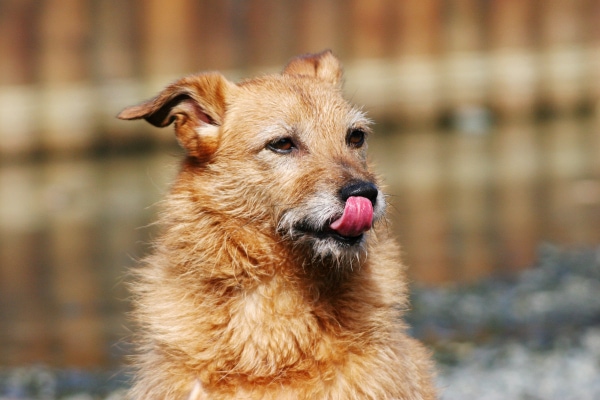
As a veterinarian, I love it when I meet highly observant dog parents. Their ability to notice a change in their dog’s health, behavior, or appearance helps catch new issues as soon as they start. And it makes my job a lot easier too.
For example, my client, Mary, brought her 8-year-old male Golden Retriever, Montana, in to my office one day. She said to me, “My dog keeps licking his lips, drooling, and swallowing. Is this normal?”
I told her that this was an excellent question, and I was glad she brought Montana in a for visit. There are many reasons why dogs might lick their lips frequently—some are normal and some are not.
When investigating lip licking behavior, it makes sense to start with the “normal” reasons. And then from there, we can move on to the “abnormal” reasons.
When is it normal for a dog to lick his or her lips?
Just like with people, some amount of lip licking is totally normal for dogs. You probably lick your lips periodically through the day without giving it a second thought. And your dog can be the same way. Common normal reasons for lip licking in dogs include:
- Hunger
- Smelling something appetizing
- Being excited
Indications that lip licking isn’t normal
However, there are also plenty of times it isn’t normal for a dog to keep licking his or her lips. Often, but not always, these dogs may show other signs in addition to the lip licking. Some of the more common symptoms include:
- Difficulty chewing
- Excessive drooling
- Decreased appetite or drinking less water
- Pawing at the mouth
- Shying away or whimpering when you try to touch the head or mouth
- Gulping or swallowing abnormally
- Gagging, retching, or vomiting
- Panting, pacing, whining, or otherwise acting stressed
10 Abnormal reasons a dog keeps licking his or her lips
If you see excessive lip licking plus some of these other signs, there is a good chance it is due to an underlying medical problem or behavioral concern. Let’s take a look at the top 10 conditions that could be the culprit.
#1: Dental disease
One of the most common reasons for a dog licking his or her lips is oral discomfort and dental disease.
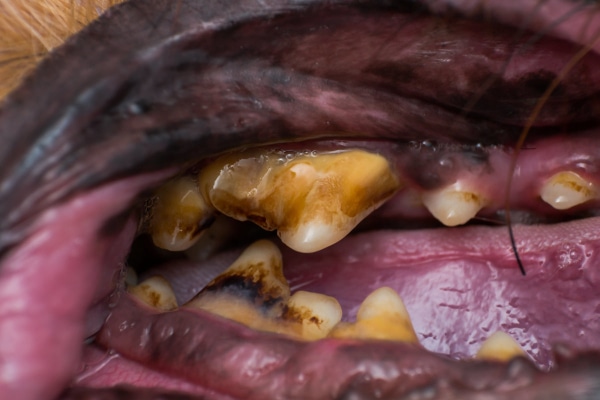
Unfortunately, our dogs are not able to brush and floss their teeth twice daily like you and I do (or should at least). As a result, tartar and plaque can accumulate quickly on the teeth, leading to dental disease in dogs (i.e. periodontal disease). Dogs licking their lips due to dental disease often show other signs such as:
- Bad breath
- Excessive drooling
- Dropping food or wincing when eating
- Being reluctant to eat
- Rubbing or pawing at the face (or other signs your dog is in pain)
- Dog losing teeth
- Excessive sneezing
- Swelling under the eye (a sign of a dog tooth abscess)
If you notice these symptoms, I recommend looking at your dog’s gums and teeth and checking inside your dog’s mouth. You may be able to see:
- Broken or missing teeth
- Red, swollen, irritated gums which may be bleeding
- Yellow, brown, or black plaque and tartar on the teeth
- A foreign object stuck between the teeth (see #2 below for details)
Safety note: Anytime you look inside your dog’s mouth (or attempt to examine him or her in general), please assess your dog’s body language. If he or she is in pain or nervous, you may notice your dog cowering, avoiding contact, hiding, looking away, showing the whites of the eyes, raising a lip, or having the hackles up. These are all indicators that your dog is uncomfortable and wants to be left alone. In this case, please do not continue to try to look in your dog’s mouth. Instead, leave it to your veterinarian.
Head to the veterinarian
Whether you can look in your dog’s mouth or not, I recommend consulting your veterinarian if you notice any of these symptoms or observe other visible changes to your dog’s mouth. Dental disease can be very painful. And the best (and often only) way to address it is having your veterinarian perform a dental procedure under general anesthesia. This allows the vet to assess and clean your dog’s teeth and perform a dog tooth extraction on any damaged or diseased teeth.
Addressing your dog’s dental disease is very important to help ease your dog’s pain. Plus, dental disease can increase the risk of heart disease in dogs, or liver, lung, or kidney disease. Thus, don’t delay in getting your dog the help he or she needs.
#2: Foreign object in the mouth
What if you suspect your dog has dental disease, but you see perfectly clean, sparkly white teeth when you look inside his or her mouth? First of all, I would say good job keeping your dog’s teeth clean!
Then, I would recommend looking for a possible stick, foxtail in dogs, grass awn, or other foreign object lodged in between the teeth or gums. I say this because dogs with a foreign object stuck in the mouth can have many of the same symptoms as those with dental disease—including excessive lip licking, drooling, pain, head shaking, and bad breath. If you see anything abnormal, make a veterinary appointment.
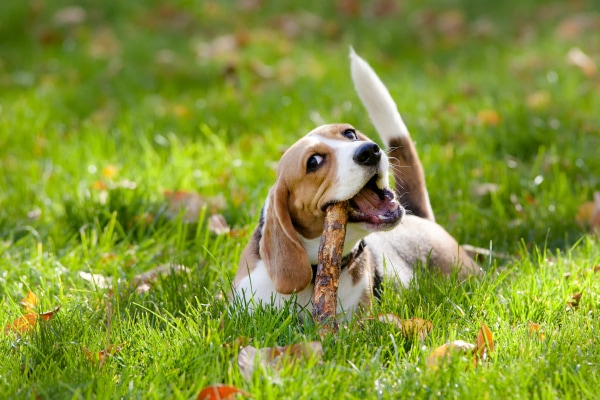
But even if you didn’t notice anything wrong in your dog’s mouth, if your dog is showing oral discomfort signs, I would recommend taking him or her to a veterinarian. Sometimes, objects can be lodged very deeply or far back in the mouth. This can make them almost impossible to see when a dog is awake (even in the most well-behaved dog).
Your veterinarian might need to do a sedated exam of the mouth to look for any lodged objects or other injuries. This allows the vet to get a good look at the mouth. And if the vet notices a foreign object in the mouth during the sedated exam, he or she will likely be able to remove it while your dog is asleep. When your dog wakes up, he or she will feel much better!
#3: Nausea
In addition to accompanying mouth pain due to dental disease or a foreign object, drooling, and lip licking can indicate your dog might be feeling nauseous.
Sometimes, when you are nauseous, your mouth might feel dry and sticky. The same feeling can happen in dogs. This causes them to drool a little more than normal. And the increased drool can lead to increased lip licking, excessive swallowing, and gulping. Plus, the nauseous dog might start eating grass too.
Nausea and abdominal discomfort can occur for a variety of reasons—some related to the digestive tract itself and others related to systemic disease.
Digestive tract issues
Let’s start by focusing in on the gastrointestinal (GI) tract. One of the most common reasons dogs are nauseous is because they ate something they shouldn’t have. In addition to lip licking and nausea, you might notice that your dog is burping, being a lethargic dog, vomiting, or having diarrhea.
When a dog is only mildly nauseous, it may simply take a few days of a bland diet for dogs and some probiotics or fiber for dogs to get him or her feeling better.
But in other cases, such as if your dog got into greasy, fatty foods, he or she may end up having pancreatitis in dogs. Unfortunately, pancreatitis can quickly progress from a dog who is licking his or her lips to one who is vomiting and experiencing severe abdominal pain. If you see these symptoms, it is important to get your dog to your regular vet quickly or make an emergency vet visit. Pancreatitis can be life-threatening in some cases.
Or, like Montana, the dog from the introduction, some dogs swallow a foreign object and it gets lodged in the digestive tract. In Montana’s case, he had gotten a piece of bone from the garbage stuck in his esophagus. Thankfully, we were able to remove it using the endoscope and he was back to himself in no time. In other cases though, a dog may need surgery to remove a foreign body from his or her stomach or intestines.
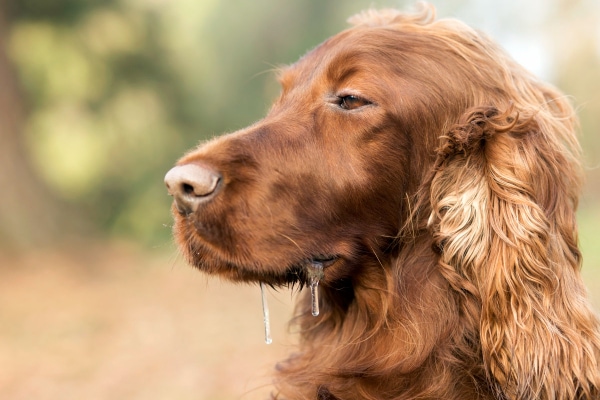
Additionally, acid reflux in dogs can also cause burping, lip licking, and generalized GI discomfort. If you suspect this could be your dog’s problem, please make an appointment with your family veterinarian. He or she can assess your dog and determine if a trial of antacids like omeprazole for dogs could be helpful.
Non-GI problems
A variety of other conditions such as kidney failure in dogs or liver disease in dogs can also cause nausea. If you are concerned that your dog isn’t feeling well, contact your veterinarian for an examination and other diagnostics (e.g., bloodwork, X-rays, ultrasound, etc.). Often, the sooner you get to the bottom of the problem, the better it is for your dog.
Toxins
Some toxins can cause your dog to start licking his or her lips, trembling, shaking, drooling, or vomiting. If you see these, or other, symptoms, please call the ASPCA Animal Poison Control Center immediately and head to the closest veterinarian. Exposure to toxins like xylitol in dogs or chocolate in dogs can be very serious, and time is of the essence.
#4: Bloat and GDV (gastric dilation and volvulus)
If your dog is exhibiting the symptoms associated with nausea and attempting to vomit but not bringing anything up, he or she may be suffering from bloat or GDV (gastric dilation and volvulus).
Bloat in dogs occurs when a dog’s stomach becomes distended with air. If the bloated stomach rotates and twists on itself, it is referred to as gastric dilation and volvulus (GDV). GDV is most likely to occur in large, deep-chested breeds and dogs who eat their food quickly.
Bloat and GDV occur suddenly and progress rapidly. While noticing your dog licking his or her lips excessively is one indicator, there are several other symptoms you should be aware of:
- Pacing and restlessness
- Enlarged distended abdomen (i.e. pot-bellied dog appearance)
- Discomfort when lying down
- Excessive panting
- Drooling
- Whining, whimpering, hunched posture, or other signs of pain
- Gagging and dry heaving
This last symptom—gagging and dry heaving—is the most classic sign of bloat (in addition to a visually bloated abdomen). Anytime I hear a client say that their dog has a painful stomach and is unsuccessfully trying to throw up, I always recommend a trip to the veterinarian or an emergency clinic immediately. And I would give you the same advice if you are seeing those symptoms, or other symptoms on this list.
GDV can rapidly become life-threatening, and the prognosis is linked in part to how quickly and aggressively the GDV is treated. Therefore, it is critically important to get your dog to the vet ASAP. Also, if you have a dog who is at risk for GDV, your vet may talk to you about how gastropexy in dogs can help prevent GDV.
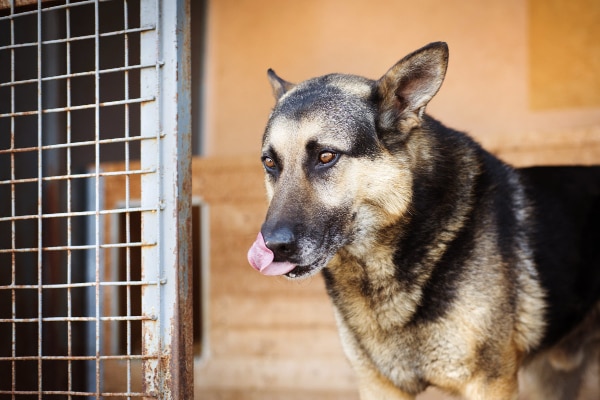
#5: Seizures
Changing gears a bit, seizures are another cause of lip licking that may warrant an emergency trip to the veterinarian. Similar to seizures in humans, dog seizures are variable in appearance—not all of them involve the dog convulsing on the ground.
The three main types of seizures in dogs are:
- Psychomotor seizures in dogs—During this type of seizure, dogs may stare into space or seem to be in a daze. These strange behaviors are not typically accompanied by abnormal physical movements like trembling or shaking.
- Focal seizures in dogs or partial seizures—When abnormal electrical activity only occurs in one area of the brain, a dog exhibits localized symptoms. These might include movement of only one limb, facial twitching, lip licking, lip smacking, or chewing movements.
- Grand mal seizures in dogs or generalized seizures—These are severe seizures that affect multiple areas of the brain. They may cause complete loss of consciousness and violent limb movements (typically what you may think of when you hear the word “seizure”).
Especially with the less typical types of seizures, it can be difficult to determine if what you saw was a seizure or something else. It is easy to confuse seizures with health problems like heart disease, which may cause a dog to pass out (i.e. experience a syncopal episode). And vestibular disease in dogs, a dog stroke , or dog head tremors can also look a bit (or a lot) like a seizure.
Therefore, if you suspect your dog had a seizure, I recommend taking him or her to the veterinarian for an exam. This is especially important if this is the first time your dog has shown seizure-like behavior. Your veterinarian can perform a physical exam, neurologic exam, blood work, X-rays, or advanced imaging to rule in/out a seizure or other abnormal event.
#6: Allergies
A more common, but thankfully much less emergent, cause of excessive lip licking (and licking in general) is allergies. Along with dental disease, allergies are right at the top of the list of the most frequently diagnosed reasons a dog keeps licking his or her lips.
Dogs who suffer from allergies to food, fleas, or the environment may also lick the nose, abdomen, or base of the tail. And you may notice they have itchy dog paws. Plus, dogs with allergies may show symptoms such as:
- Red, irritated, dry skin
- Excessive chewing or hair pulling (which may lead to hair loss on a dog’s tail)
- Excessive scratching
- Head shaking
- Skin that is warm to the touch
- Increased grooming
- Hair loss (either complete baldness or patchy hair loss)
- Red, swollen eyes
- Pink discoloration of the paw fur
- Ear infections (i.e. otitis in dogs)
- Frequent dog paw yeast infections and bacterial skin infections (i.e. pyoderma in dogs)
Some dogs with allergies might experience most or all of these symptoms. However, other dogs have more subtle symptoms, such as excessive licking only. This is part of what makes diagnosing allergies (and other skin conditions) so difficult.
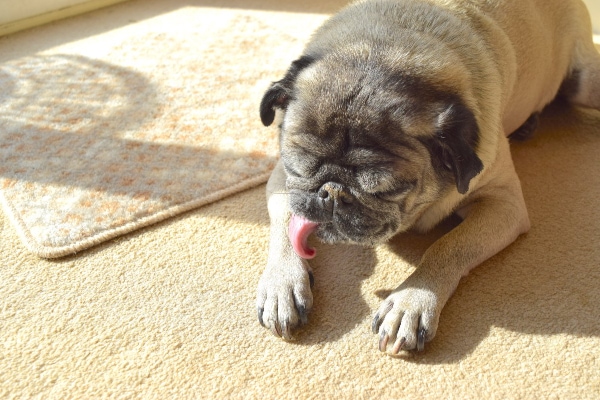
Diagnosing and treating allergies
Therefore, if you suspect your dog has allergies, it is important to consult your veterinarian. He or she will ask you a series of questions and perform a physical exam on your dog. Then, your vet may talk to you about the next diagnostic steps. This might be a food trial to rule in/out food allergies, blood or skin tests to determine which environmental allergens affect your dog the most, skin or ear cytology, and cultures to identify bacterial or yeast infections, or something else.
The diagnostic process may take some time and trial and error. However, the good news is that finding the right allergy medicine for dogs can give your dog almost miraculous relief in some cases. It is amazing how the proper combinations of medications, foods, or shampoos can bring back a dog’s fur coat and make him or her feel like a new dog again.
#7: Dehydration
Continuing on with medical reasons for lip licking, thirst and dehydration is an easily overlooked (and usually easily corrected) causes.
If you have ever been outside working, walking, or hiking on a hot summer day, you are probably very familiar with that sudden feeling that your mouth and lips are bone dry. You immediately know that you need water. And as you reach for your water bottle, you lick your lips to relieve that dry, uncomfortable feeling.
The same goes for a thirsty and dehydrated dog. If you have been outside, or the weather is hot, and you are asking, “Why does my dog keep licking his or her lips and nose?”, the answer might simply be that he or she would like some water. (But if your dog has collapsed, seems disoriented, or is panting heavily, these could also be signs of heat stroke in dogs, which is a medical emergency.)
If you offer your dog water and the lip-licking resolves, it is likely he or she was just thirsty and feels better now. However, if your dog keeps licking or becomes weak and tired, he or she may be suffering from more significant dehydration.
How to recognize dehydration in dogs
The quickest way to check your dog for dehydration is by looking at the gums. Normally, the gums should be a bright pink color and feel moist. But if your dog’s gums are sticky or dry, this could be a sign of dehydration.
Additionally, if you push on your dog’s gums, they will turn white. Within two seconds or less, the white should disappear and the bright pink should return. This is called the Capillary Refill Time (CRT). If this takes longer than two seconds, your dog might be dehydrated (or have a different health problem).
If you suspect your dog is dehydrated, I recommend taking him or her to the veterinarian. He or she can assess your dog first. And then the vet can administer fluid therapy (either IV fluids or subcutaneous fluids for dogs) if your dog is dehydrated. This will help your dog feel much better. Plus, the vet can often treat the underlying problem that caused the dehydration (if there was one) at the same time.
#8: Canine cognitive dysfunction
Up to this point, we have only talked about medical problems that may cause lip licking. But a dog who is licking his or her lips could also have a behavioral issue (as we will discuss for causes #9 and #10 below). Or, in the case of canine cognitive dysfunction (CCD), the dog can have a behavioral condition due to a medical problem.
Canine Cognitive Dysfunction is equivalent to doggie Alzheimer’s or dementia. As your dog ages, so does his or her brain—leading to a decline in cognitive function. While this is a common consequence of aging, it isn’t “normal.” I say this to make a point because all-to-often, dog parents chalk up new CCD behaviors to “normal dog aging.”
Indications of CCD
However, a senior dog who keeps licking his or her lips, swallowing, and yawning, especially at night or before sleeping, might have CCD. This is particularly likely if the dog is also showing other signs of dementia in dogs such as:
- Anxiety—increased pacing and panting, unable to relax, senior dog anxiety at night
- Less engaged—decreased interest in socializing with the family, decreased activity, sleeping more often
- Disorientation—gets stuck in corners, seems lost in the house, forgets where food and water dishes are located, forgets where the door is to go outside
- House soiling—previously potty trained but now has accidents
- Changes in sleep-wake cycles—awake, restless, and roaming at night (which is why CCD is also called sundowners in dogs)
If you suspect your dog has CCD, fill out a canine cognitive dysfunction checklist and then consult your veterinarian. Additionally, I would recommend taking videos of the behaviors that you believe indicate doggie dementia. This will help your veterinarian reach a diagnosis. And it can help him or her figure out which medications (like selegiline for dogs), supplements (like Dr. Buzby’s Brain Boost™ organic MCT oil for dogs), or environmental changes (like using mental stimulation toys for dogs) would best help reduce the anxiety, restlessness, and other problems associated with CCD.
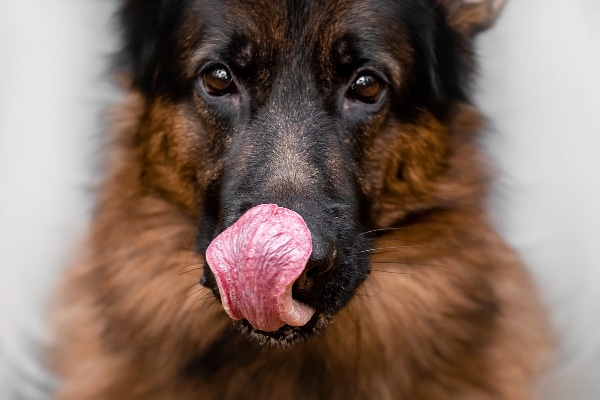
#9: Fear and anxiety
As alluded to, there are also several strictly behavioral issues that can lead to lip licking. Dogs can’t talk, so they must rely on body language to communicate with us and with other dogs.
For example, dogs naturally lick their lips as a calming signal or appeasement gesture. Behaviorists believe these types of non-verbal communication indicate the dog is feeling stressed or uneasy about a situation. And the dog wants everyone to know he or she is not a threat.
Therefore, if you notice your dog keeps licking his or her lips when in a new situation or when being petted by a stranger, it could mean that your dog feels uncomfortable. Sometimes you might also notice other signs of fear, stress, or anxiety such as:
- Lowering the head or looking away
- The hair (hackles) raising along the back
- Audible growling
- The whites of the eyes showing or your dog giving the “side eye”
- Trembling or shaking
- Yawning
- Licking the air
- Drooling
- Excessively shedding
- Turning the body away or hiding
- Panting when not hot or thirsty
(The Tufts University Cummings School of Veterinary Medicine has a great article about dog communication and body language if you are interested in learning more.)
Addressing fear and anxiety
If your dog appears fearful, it is always important to remove him or her from the situation or remove the object (or person) that is making your dog feel uneasy. As I mentioned, dogs have to communicate through body language. So, when they are telling us they are uncomfortable, it is our job to listen and protect them.
Do not reprimand your dog for being scared—sometimes that can make the fear even worse. Instead, talk to your dog in a calm, reassuring voice. Give him or her a break from the “scary situation” and offer a reward for investigating it.
If your dog is frequently fearful, it is also a good idea to talk to your veterinarian. He or she may be able to recommend some training techniques, resources, supplements, or medications that can help your dog gain confidence and be less anxious. Or your vet may suggest partnering with a trusted dog trainer who can help work through your dog’s worries.
#10: Obsessive-compulsive disorder (OCD)
In addition to fear, another behavioral reason for lip licking is obsessive-compulsive disorder (OCD). Just like humans, dogs can develop OCD. They may start performing normal behaviors in an extreme, repetitive manner. The behavior is difficult for the dog to stop. And it can even inhibit a dog’s ability to perform other normal tasks.
Dogs with OCD can show a variety of different behaviors, including:
- Pacing
- Incessant licking of the lips, paws, or another part of the body (which can lead to lick granulomas in dogs)
- Tail chasing
- Ravenous appetite
- Chasing light
- Biting at the air like he or she is catching flies
- Excessive water drinking (unrelated to any of the causes of increased thirst in dogs)
- Dirt eating
It is important to remember that it can be completely normal for a dog to do some of these behaviors occasionally. However, it is not normal for your dog to repeatedly do these activities and to be unable to be distracted from them.
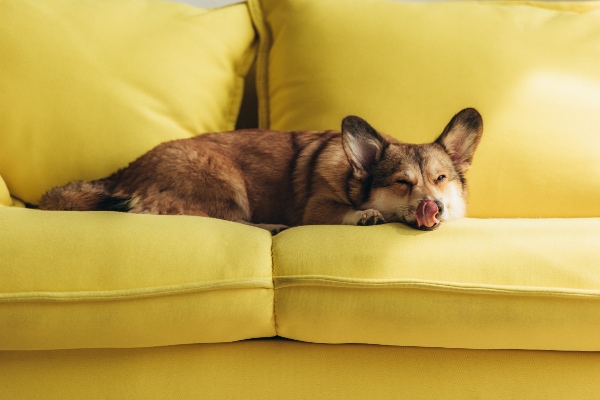
Reaching an OCD diagnosis
If you suspect your dog has OCD, please consult your veterinarian. Left unchecked, these behaviors can sometimes lead to physical harm to your dog. Plus, OCD may be rooted in anxiety or other behavioral concerns, which aren’t pleasant for your dog either.
Leading up to your appointment, I recommend taking videos of the behaviors you see at home. Often, dogs will not perform these behaviors in a vet hospital because they are in a new situation. Therefore, it is very helpful if you can capture examples of what happens in the normal home setting.
Your vet can use the videos to get a good idea of what you are seeing. Plus, in combination with the physical exam and other testing, the videos can help rule out partial seizures or other medical concerns that can look like OCD.
Finally, the videos will also help your vet develop an effective treatment plan for your dog. By seeing your dog in action, your vet can tailor the plan to address your dog’s specific issues or behaviors.
Lip licking—normal or not?
What if you have read through these ten medical or behavioral conditions that might explain why your dog keeps licking his or her lips, and none of them seem to fit? It is likely that your dog’s lip licking is normal for him or her.
However, if you have any questions or concerns, or the lip licking suddenly increases in frequency, it is best to consult your veterinarian. This isn’t an exhaustive list, and your “dog parent intuition” is worth listening to.
Knowing what is normal
Finally, one of the things that can help hone your intuition is being very familiar with your dog’s normal state. This is why I recommend performing a 5-minute health scan of your dog at least once a month (but weekly is better).
By routinely examining your dog, you will quickly learn what is normal for him or her. And, you will be able to detect abnormal changes or problems much sooner. This is invaluable because often a faster diagnosis means a better prognosis.
If you want to learn how to perform this 5-minute exam on your dog, I recommend taking the Tip to Tail Health Scan™ Master course. I truly believe knowing how to assess your dog will help you detect problems sooner. And it can make you an even better advocate for your beloved companion too.
If your dog kept licking his or her lips, was one of these 10 causes the culprit?
Please comment below.


Hello toe grips! I do think your info has helped! I’m thinking on my pup it could be the bloat & Gdv one as his “potbelly” has me stumped until now! I’ve been trying to get into our vet but they’re so busy it’s a month or two before he can be seen. Also the are super expensive!! My pup is worth it but I just don’t have that kind of money!! The expense seems so excessive!! I know Vets are worth it but these guys are really expensive & now everything has gone up its twice as bad & I barely get by in an fixed income!!! However I’m may try another Vet or get into our under the embassy!! I signed up for your senior dog info!! Thank you & God bless!! Tanya & RinTinTin 🌹
Hi Tanya,
I am glad the article was helpful. Please understand that if your dog truly has a GDV then this is a life-threatening emergency and absolutely cannot wait. I am hoping the cause of his potbelly is something else entirely. If you are concerned about your pup’s wellbeing, then I encourage you to schedule a visit with your vet sooner rather than later. Wishing you both all the best. Take care!
hello, my dog mostly licks her lips when we are coming from outside. not all the time. specially in winter time its more often. she start excessively licking her lips and then paws. at first its like she wants to sneeze and then just licking her lips like crazy. i have a video of some licking if i can send it to somewhere
Hi Anna-Liisa,
I understand your concern for your dog and agree this needs to be investigated. I highly recommend you show the video to your vet and have them examine your pup. These episodes could be seizure activity or signs of another serious issue. I am hopeful you can get the answers you need. Praying for a positive outcome for your sweet girl.
A very comprehensive and helpful article. Many thanks.
Hi Ms. Margaret,
Thank you for the great feedback! Best wishes to you and yours!
I think this time my dog’s lip licking as just a momentary thing. The best takeaway for me with this visit was the remark about shooting a video of any odd behavior. That could be very useful to remember at some point in the future. Thank you for that suggestion.
Hi Susan,
Thanks for sharing and I appreciate your feedback! Best wishes to you and yours!
My cavalier wakes up at night and is lSmacking and licking his lips. He has water available, It sounds like he might have. a dry mouth but makes no attempt to get up to get a drink of water. He does this for a while then goes back to sleep. He is waking us up making for cranky dog parents. HELP!!
Hi Diane,
I am sorry you are dealing with this frustrating situation with your pup. Lip smacking can be a symptom of GI issues such as reflux, but this can also be signs of a focal seizure. I highly recommend you contact your vet and make sure they are aware of these strange behavioral episodes. Hoping they can get some answers and start the necessary treatment. Best wishes and good luck!
My senior dog just recently started doing this and his breath was horrible. Come to find out he had some teeth issues. Took him to the vet and got him treated. Now, along with brushing his teeth twice a week, I also use a powder daily that I mix in with his food and that helps any tartar and plaque build up and with the bad breath also. Great article with lots of information! Thanks!!
Hi Stephanie,
I am glad you were able to get your boy the care he needed, and his dental issues have resolved. Thank you for sharing your experience with us. You are doing a great job with the weekly brushing and daily dental powder. Wishing you both many happy days ahead. Keep up the good work!
Hi my Frenchie has just started pacing around frantically licking her lips and chewing her paw, it’s come out of nowhere
Hi Mark,
I understand your concern for your Frenchie with this strange behavior. Anytime a dog has a sudden change in their behavior it is a good idea to have them evaluated by a vet. I encourage you to schedule an appointment to have your girl examined. Hoping for quick answers and a clear path forward.
This is such a helpful article. Thank you.
Hi Kim,
Thanks for the positive feedback!